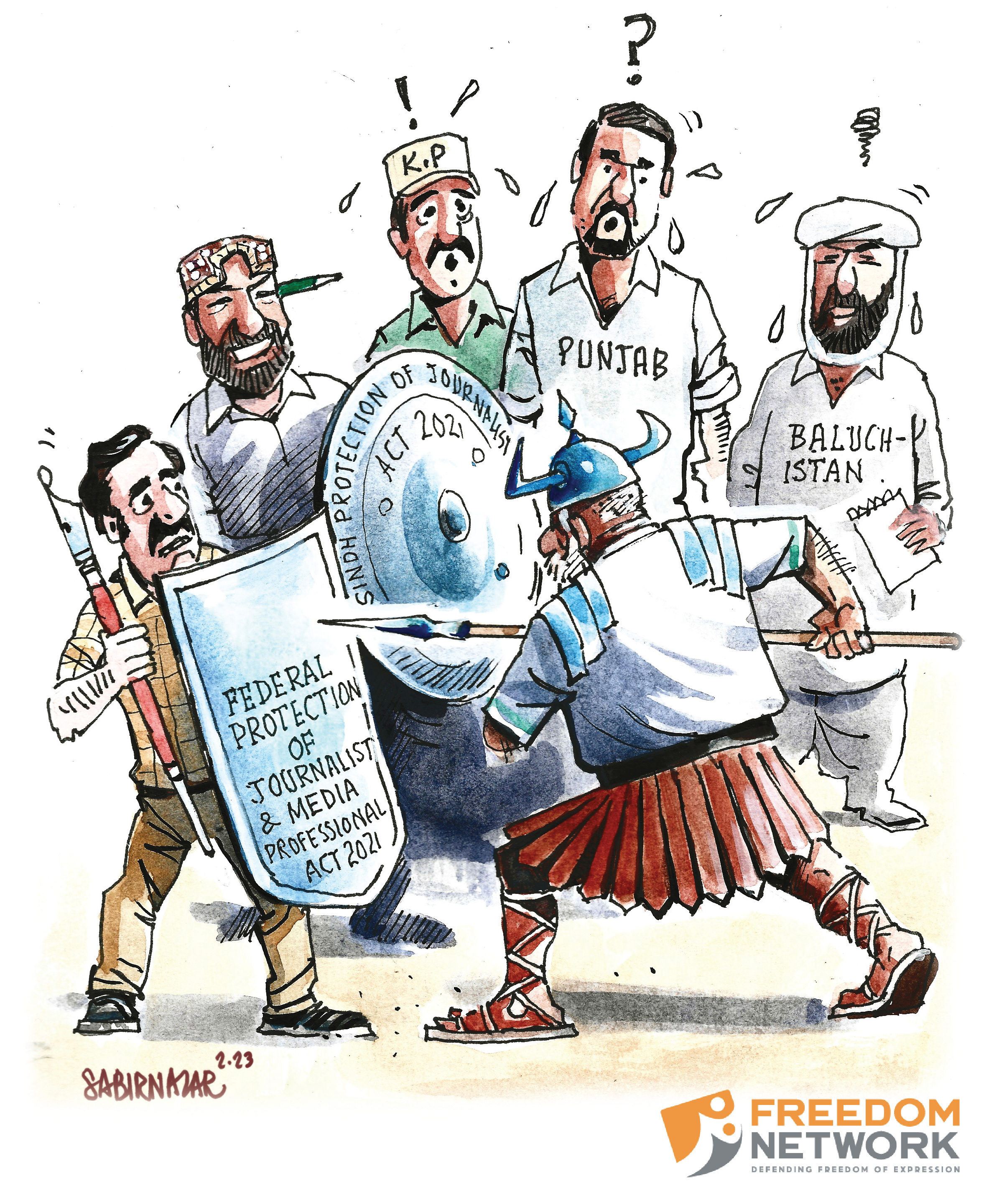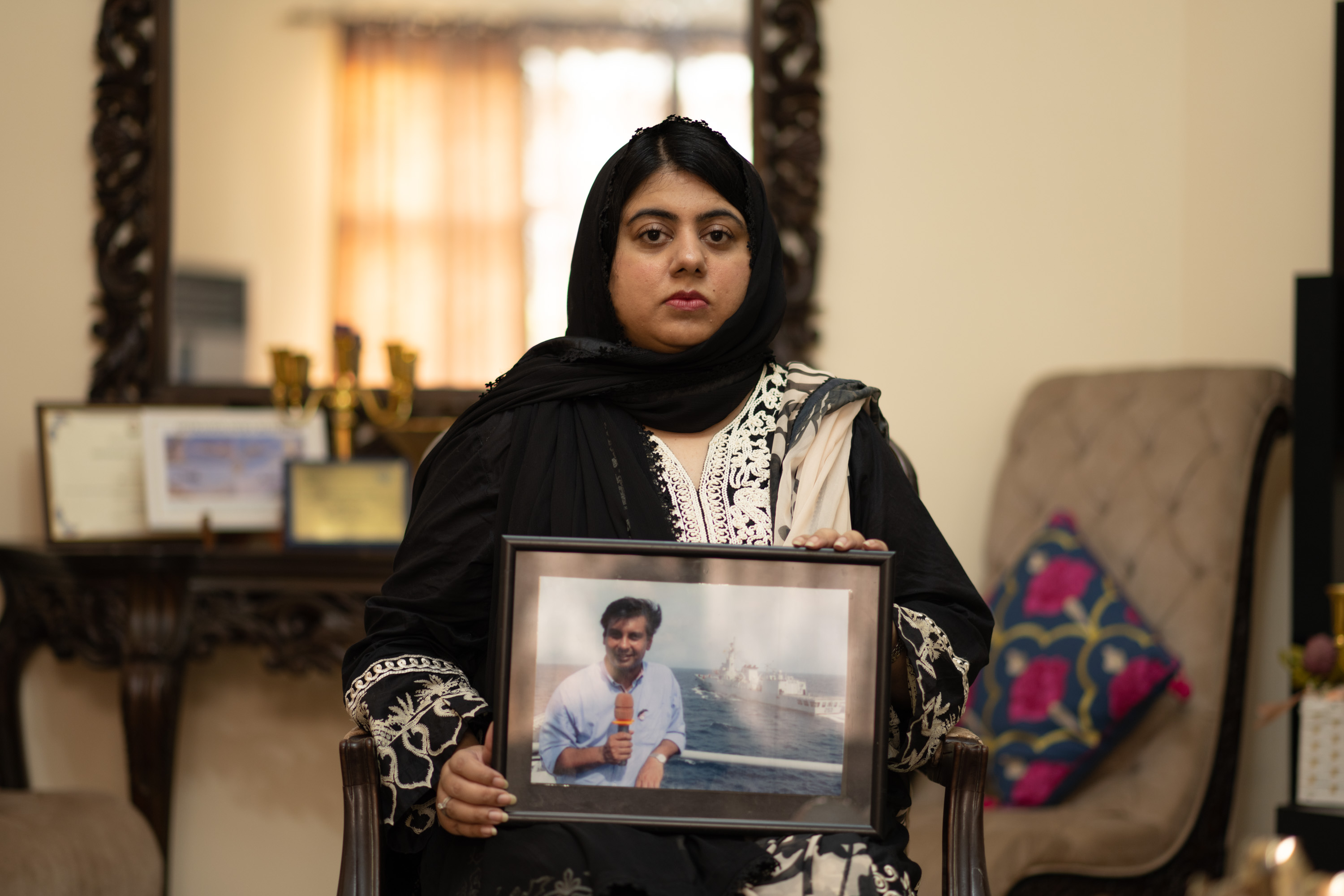By Aliya Iftikhar/CPJ Asia Research Associate on August 17, 2017 12:36 PM ET
When a criminal gang sent threatening messages to Ghulam Mustafa, the reporter said his only option was to stop working for the Pakistani station Geo News. Mustafa acknowledges that laying low for nearly three years was the right decision to ensure his safety, but he said, “Professionally, it was strange that I was not working. I was very frustrated, I lived in tension for many years.”
Fortunately, for journalists in Pakistan today who face attacks and threats, a network of safety hubs has been set up so they don’t have to face the same tough decision of giving up reporting for their own protection. Mustafa uses his experience of dealing with threats to help colleagues through his role as the Karachi regional manager for the Pakistan Press Clubs Safety Hubs.
The safety hubs, which were set up by Iqbal Khattak, director of the local press freedom group Freedom Network Pakistan, and members of the media community in 2015, are an attempt by journalists to provide protection for each other. Journalism is a dangerous business in Pakistan, and reporters there are at risk of attack or even death from militant groups, gangs, political parties, and even law enforcement and security agencies. Since 1992, 60 journalists have been killed there in relation to their work, CPJ research shows.
The Karachi branch of the Pakistan Press Clubs Safety Hubs. The network, which has offices in several cities, helps at-risk journalists. (Ghulam Mustafa/Karachi Press Club)
The safety hubs, which were set up in several cities across the country, provide assistance to journalists in distress, and document and monitor threats the press community faces, Khattak said. Although security concerns mean the safety hubs do not have offices in the Federally Administered Tribal Areas, Khattak said that the network provides coordination and assistance to journalists in those regions. And, because the hubs are staffed by members of local press clubs, they are set up to respond to the specific threats in each region. In Sindh province, where Mustafa is based, for instance, the most common threats come from political parties and law enforcement agencies, he told CPJ.
Late last year in Karachi, Mustafa used the network to help intervene on behalf of a television reporter who security forces had beaten and detained. After being notified of the journalist’s case, members of the safety hub approached officials and the journalist was released within an hour, Mustafa said. The security force later issued an apology.
In a similar case in northwest Pakistan, a journalist contacted the safety hubs to say a police officer was threatening him over his reporting on security issues, Khattak said. The regional manager for the hub took the case to senior police officials, who questioned the officer and reached a settlement with the journalist, who then withdrew his complaint, Khattak said.
[EDITOR’S NOTE: The safety hubs requested that the names and details of the cases of the journalists they help be withheld for safety reasons.]
As well as intervening to help at-risk journalists, Freedom Network Pakistan publishes monthly reports on the press freedom violations it has recorded and the actions it took. Every threat that is reported to them is evaluated and the information is cross-checked, Khattak said. The organization uses the information to look at options to help journalists, including mediation, relocation, negotiating with local government officials or providing legal assistance or medical assistance.
The safety hubs also evaluate threats to journalists who may be in immediate danger and hold meetings with the government, political parties, editors, and police to discuss issues and promote safety, Mustafa said. In June, the Peshawar hub contacted journalist unions in the restive region of Waziristan to discuss ways to partner with them, and in April, safety hub managers offered training in physical and digital safety for about 65 journalists in Islamabad, Karachi, and Quetta.
“Raising awareness is essential–threats against journalists should be recognized and given importance,” Mustafa said.
Khattak said that one of the group’s priorities has been working with provincial governments to provide legislation protecting journalists in each province. “The issue of journalist safety is now a national agenda issue, which was not the case before unfortunately,” Khattak said. “We’re at the brink of having journalist laws and journalist safety both at the federal and provincial levels … We are making [the government] shoulder responsibility of protecting journalists.”
For journalists who cover sensitive issues such as religion, such support would be welcome. Rana Tanveer, a reporter for the Express Tribune, told CPJ he was forced to leave his home temporarily after receiving a series of threats and being injured in a hit-and-run incident in Lahore in June. Tanveer, whose leg was broken in the crash, says he believes it was a deliberate attempt on his life.
Police are investigating the crash, but Tanveer said that they took no action when he reported the threats–including graffiti calling for his death that was painted on his home. Tanveer praised Khattak for reaching out to him during that period and offering support, but he says that many local press organizations stayed silent on his case because he reports on religious minorities–an issue that led to the graffiti accusing the reporter of being an “enemy of Islam.”
Blasphemy allegations and accusations of being “anti-Islam,” like the ones Tanveer faced, are a new way to strangle press freedom and the internet, Khattak said. He added that he plans to focus on cybercrime laws next with the safety hubs and said he thinks that the journalist community should take internet freedom more seriously. “Pakistan is moving away from the freedom it used to enjoy,” Khattak said.
Aliya Iftikhar is CPJ’s Asia Research Associate. Prior to joining CPJ, Iftikhar was a research assistant at the Middle East Institute and interned at the U.S. Department of State. She has worked with Amnesty International and written for Vice News.
This blog was first published on CPJ website
In Pakistan, Safety Hubs Provide Support For Journalists At Risk
- August 28, 2017
- 6:20 am
- 2 Comments
More from the News section
September 18, 2023
No Comments
July 26, 2023
No Comments
June 20, 2023
2 Comments
March 21, 2023
No Comments
August 30, 2022
No Comments

Resize text-+=


It looks like you’ve misspelled the word “chanel” on your website. I thought you would like to know :). Silly mistakes can ruin your site’s credibility. I’ve used a tool called SpellScan.com in the past to keep mistakes off of my website.
-Kerri
Thank you for noting the spelling mistake. We will get corrected.
Editor
Leave a comment